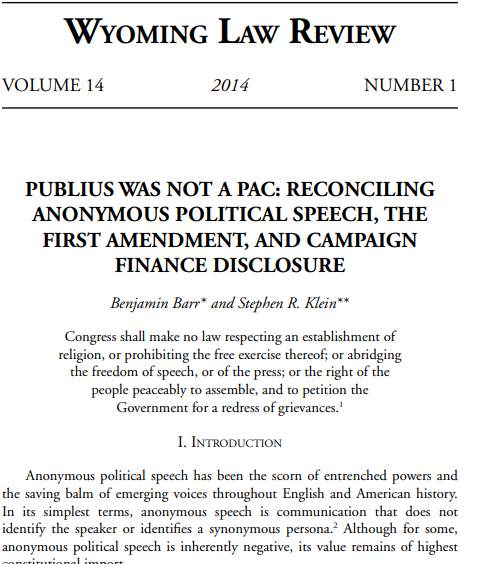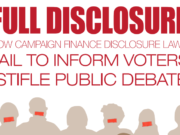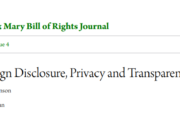In this Wyoming Law Review article by Benjamin Barr and Stephen R. Klein, the authors emphasize the importance of anonymous political speech. As they explain, modern campaign finance law has eliminated many avenues for anonymous political speech in both federal and state arenas. Under today’s disclosure regimes, citizens who band together and spend as little as $1,000 criticizing or complimenting federal officeholders may be forced to register and report as a political action committee with the Federal Election Commission.
As Barr and Klein note, ironically, one of the most important influences on the ratification of the United States Constitution would face civil and possibly criminal penalties if it failed to register and report as a PAC under current campaign finance regulations. Publius, the collective author of The Federalist Papers, would have to register if they discussed a political issue in numerous states. As disclosure expands under federal law, Publius might also be ensnared in federal regulations.
This article criticizes federal and state campaign finance disclosure laws on First Amendment and political privacy grounds and offers several suggestions for reform respectful of these concerns. Part II of this article offers a history of anonymous speech and suppression of political speech generally. It also illustrates the benefits of anonymous speech to political discourse and participation in the American experiment. Part III is a political speech primer, laying out the basic principles for protecting political speech constitutionally, and identifying the schism between free speech and campaign finance reform. Part IV discusses the difficulty and expense of complying with campaign finance disclosure. It also discusses efforts to expand campaign finance disclosure laws to reach practically all political speech. Finally, Part V discusses the paradox surrounding legal protection of anonymous speech, and offers various proposals to bolster political privacy.
You can read the full article here.














